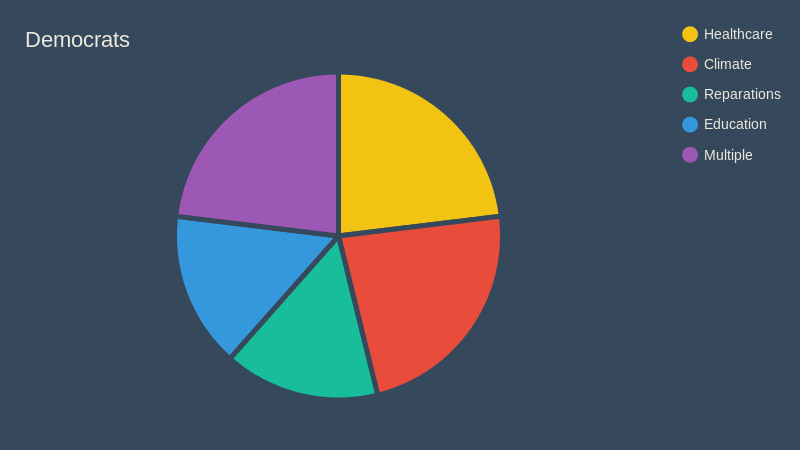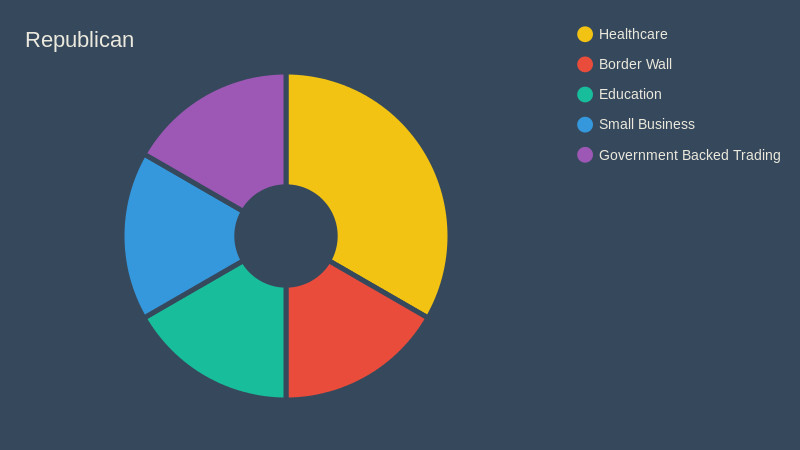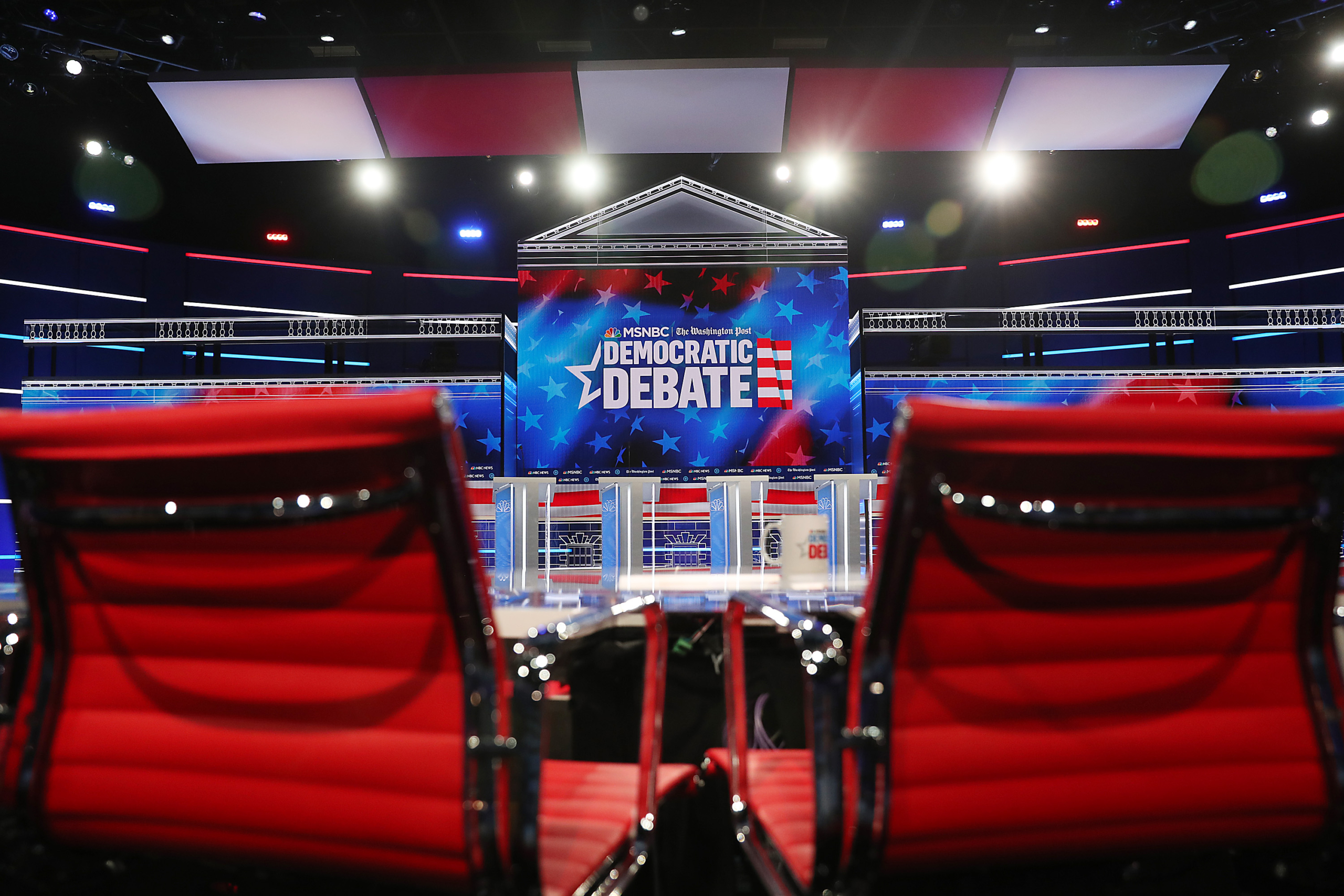Sign up for The Media Today, CJR’s daily newsletter.
Across six nationally televised debates, moderators have asked 2020 Democratic presidential candidates 200 questions. A team of CJR contributors analyzed those questions, and compared them to the 308 questions put to candidates during the first six Republican Party presidential debates ahead of the 2016 elections. Our findings? Moderators for the recent Democratic debates have asked candidates twice as many questions about climate change and healthcare, and almost three times as many questions about gun control. Compared with the moderators for the Republican debates, they’ve focused significantly less on religion, and asked candidates more “how will you pay for it” questions focused on funding for policy proposals. And they are fixated on Donald Trump, who appears in questions even when irrelevant.
ICYMI: A Florida county weighs its recent role in Trumpian culture wars
Questions to the 2020 candidates mentioned Trump sixty-six times, either by name or by title. (By comparison, questions to the 2016 Republican candidates mentioned Barack Obama fifty-one times.)
A number of questions from moderators engaged Trump directly, and presented candidates with more specific opportunities for critique. (“No US president has ever been prosecuted for crimes after leaving office,” MSNBC’s Rachel Maddow said to John Delaney at the first debate, in June. “Do you believe that President Trump could or should be the first?”) Most, however, engaged Trump indirectly, often using him to frame questions, many of which need not have mentioned him. In September, Jorge Ramos mentioned concerns from Trump and Brazilian president Jair Bolsonaro that climate-related regulations might hamper economic growth before asking Cory Booker whether more Americans should become vegan.
By contrast, moderators have mentioned Bernie Sanders twenty-three times; the next most mentioned candidate, Elizabeth Warren, came up twelve times. Of the six networks to broadcast and moderate debates, CNN’s moderators often seemed most pugnacious; they were more likely to ask candidates to comment on each other. (For instance, in July, Jake Tapper asked John Hickenlooper whether Sanders was “too extreme to beat President Trump,” then asked Sanders to respond to Hickenlooper.)
Ahead of the 2016 elections, moderators for the first six Republican debates focused their questions on immigration. They asked a total of twenty-eight questions on the topic. Other popular topics included taxes (seventeen questions), the economy (sixteen), electability (sixteen), isis (sixteen), and “accountability” (categorized by CJR as questions that probe candidates’ past records). Questions from the first six Democratic debates, by contrast, have focused primarily on healthcare (nineteen questions), with significant numbers of questions about Trump (seventeen), accountability (fifteen), immigration (fourteen), and climate change (twelve).
Moderator questions often seemed tailored to party priorities––appropriate for debates that produce party nominees. Still, what moderators choose to spend airtime on elucidates how moderators think about voters’ priorities. In the recent Democratic debates, climate, guns, and race broke the top ten most discussed topics—a sharp contrast to the GOP debates, where they were mentioned six times, four times, and once. Conversely, neither national security nor government size—frequent questions for Republicans—landed in the top ten topics for Democratic candidates in the 2020 race. In both debates, Trump loomed large.
During the first six Republican debates, candidates received just six questions about climate change—half the number fielded so far by Democratic candidates. Current Democratic candidates have also fielded twice as many questions about healthcare as Republic candidates did before the 2016 elections—an indication, perhaps, that the media sees it as more of an ideological wedge for differentiating Democratic candidates. On the subject of gun control, moderators have asked Democratic candidates eleven questions, about mandatory gun buybacks, assault-weapon bans, and mass-shooting prevention, among other things. For example, David Muir of ABC News asked Beto O’Rourke, “You’ve said, quote, ‘Americans who own AR-15s and AK-47s will have to sell them to the government, all of them.’ You know that critics call this confiscation. Are you proposing taking away their guns? And how would this work?” During the first six Republican debates, candidates received just four questions about gun control.
Questions about the economy reliably occupy a sizable chunk of time. In recent history, however, Republicans have fielded more of them. During the first six Republican Party presidential debates, candidates were asked sixteen economics questions, compared to just eight posed during the first six Democratic Party presidential debates.
Moderators in the 2016 debates tended to ask more substantive economic questions. In an emblematic example, Maria Bartiromo of Fox Business asked Ted Cruz, “Explain how your plan works. How can you cut taxes as much as you propose without running up debt and deficits?”
In the most recent Democratic debates, moderators struck a particularly simplistic and uninformative tone, asking questions seemingly designed to elicit a predetermined answer. In June, NBC’s Jose Diaz-Balart asked two candidates to “promise” to return all manufacturing jobs to “places like” Ohio, as Trump had. This question both assumes that Trump has the power to return these jobs to Ohio and positions opponents to appear either unrealistic or less effective than their competitor.
That said, moderators did take advantage of the opportunity to probe at a host of new ideas from candidates, such as Andrew Yang’s universal basic income, or Sanders’s and Warren’s wealth tax.
A presidential debate is a prime moment for moderators to grill candidates on the feasibility of their policy proposals and plans, especially when it comes to matters of cost. During the first six 2016 Republican Party debates, moderators asked candidates six funding-related questions: two about healthcare, one about the southern border wall, one about education, one about small business, and one about government-backed trading. Democratic candidates fielded thirteen questions about how they would pay for proposed projects and initiatives, as well as about transparency in such matters. Of those thirteen, three focused on healthcare, three on the climate, two on education, and two on reparations.


Pie charts represent distribution of topics moderators asked funding-related questions about.
In October, Marc Lacey, of the New York Times, noted Warren’s plans for covering costs related to her free public college and universal childcare proposals. “But you have not specified how you’re going to pay for the most expensive plan: Medicare for all,” Lacey said. “Will you raise taxes on the middle class to pay for it, yes or no?” More generally, NBC’s Savannah Guthrie asked Kamala Harris in June, “Do you think that Democrats have a responsibility to explain how they will pay for every proposal?”
Republican candidates fielded six questions about religious liberty; current Democratic candidates have so far fielded none. Religion framed other questions to Republican candidates in 2016, including those pertaining to LGBTQ rights. During the 2016 Republican Party presidential debates, moderators asked candidates seven questions concerning the rights of LGBTQ people; of those, four focused on religious freedom. By comparison, moderators have asked Democrats just one question on the topic of LGBTQ rights: MSNBC’s Chuck Todd asked Tulsi Gabbard why LGBTQ voters should trust her despite her changing her stance on same-sex marriage, and other matters of equality, during her political career. Moderators of the Republican debates asked five questions pertaining to abortion; moderators of the Democratic debates have asked three.
Democratic Party presidential candidates have so far faced six questions from moderators about policing; all six were framed in relation to communities of color. For example, Maddow asked Pete Buttigieg, “The police force in South Bend is now 6 percent black in a city that is 26 percent black. Why has that not improved over your two terms as mayor?” ABC’s Linsey Davis asked Amy Klobuchar, “During your eight years as a prosecutor in Minnesota, there were dozens of incidents where black men were killed by police. Critics say that too often you sided with police in these cases. The ACLU’s legal director in Minnesota has said that you showed no interest in racial justice. Do you wish now that you had done more?” In contrast, Republican candidates for the 2016 presidency faced just three questions about policing, only one of which mentioned race. (Megyn Kelly asked Scott Walker, “Many in the Black Lives Matter movement, and beyond, believe that overly aggressive police officers targeting young African Americans is the civil rights issue of our time. Do you agree? And if so, how do you plan to address it? And if not, why not?”)
During the Democratic debates, networks most often turned to moderators of color to ask questions about race, Latin America, and immigration. Davis, who is the third Black woman to moderate a presidential debate, asked six questions about race; CNN’s Don Lemon asked all of the questions that mentioned reparations; and Univision’s Ramos asked eight questions that related to Latin American countries and immigration. In the Republican primary, there was only one person of color who moderated, CNBC’s Carl Quintanilla. (This Wednesday’s debate will be the third in American history moderated exclusively by women.)
The changing questions across these debates reflect partisan interests, shifting incumbent power, and general trends in American society. While debates continue to have the ability to inform the public, they still devolve into a media spectacle. Trump, an attention-monger, reigns supreme over both sets of debates.
The country has changed; the media circus hasn’t.
Methodology footnote:
This piece does not consider the amount of time spent on a topic, as that largely falls on candidates rather than moderators (despite the networks’ best efforts). Instead, moderators have tight control over the number and types of questions they pose to candidates. As a result, that is the matter on which this analysis is focused.
Many of the moderators’ questions could not be grouped into clean-cut categories. Questions about abortion, for instance, are also often about courts. Questions about trade are also about foreign policy and economics. In July, CNN’s Dana Bash asked Sanders, “You want to provide undocumented immigrants free healthcare and free college. Why won’t this drive even more people to come to the US illegally?” This question is about immigration, healthcare, education, economics, income inequality, and race. Since Bash posed the question within a larger conversation about immigration, we categorized the question under the topic of immigration. Follow-ups when candidates neglected to answer the original question, or instances when moderators went down the line of candidates asking the same or similar questions, were treated as a single question.
THE MEDIA TODAY: An anatomy of a Republican talking point
Has America ever needed a media defender more than now? Help us by joining CJR today.




